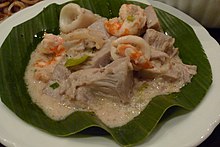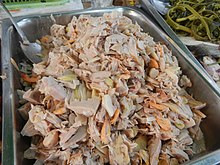Ginataang langka
  | |
| Alternative names | Ginataang nangka, Langka sa gata, Jackfruit in coconut milk |
|---|---|
| Course | Main course |
| Place of origin | Philippines |
| Serving temperature | Hot |
| Variations | Ginataang kamansi (breadnut) Ginataang rimas (breadfruit) |
Ginataang langka, is a Filipino vegetable stew made from unripe jackfruit in coconut milk and spices. The dish includes a wide variety of secondary ingredients like seafood, meat, and other vegetables. The dish also commonly adds bagoong alamang (shrimp paste) and may be spiced with chilis or soured with vinegar. Notable variants of the dish are ginataang kamansi and ginataang rimas which use breadnut and breadfruit, respectively. Ginataang langka is a type of ginataan.[1]
Description
The basic recipe for ginataang langka includes unripe jackfruit (langka, seeded and sliced), coconut milk, garlic, onion, salt and pepper to taste, and usually bagoong alamang (shrimp paste) and/or patis (fish sauce). It can also use thickening agents like white jute (lumbay), jute mallow (saluyot), or okra, among others. The dish can also be spiced with siling haba or labuyo peppers, ginger, lemongrass, and/or soured with vinegar.[2][3][4][5][6][7][8]
The secondary ingredients for ginataang langka can vary widely and includes fish (including dried fish and smoked fish), shrimp, crab, other seafood, meat (including sausages), and combinations thereof. Moringa leaves (malunggay) can also be added.[9][10][11][12][13][14]
A vegan or vegetarian version of the dish can also be created by simply omitting the meat and seafood and using mushrooms in place of shrimp paste or fish sauce.[1][15]
Variants
Jackfruit in ginataang langka can be replaced with breadnut (kamansi), breadfruit (rimas or reema), and more rarely, antipolo; resulting in ginataang kamansi, ginataang rimas, and ginataang antipolo, respectively. They are otherwise prepared identically.[16][17][18][19]
See also
References
- ^ a b "Ginataang Langka (Jackfruit in Coconut Milk)". Filipino Chow. Retrieved 19 April 2019.
- ^ "How to Cook Ginataang Langka with Tinapa Flakes". Panlasang Pinoy. Retrieved 19 April 2019.
- ^ "Ginataang Langka with Dried Fish". Jinkzz's Kitchen. Retrieved 19 April 2019.
- ^ "Alimasag at Langka sa Gata". Panlasang Pinoy Meaty Recipes. Retrieved 19 April 2019.
- ^ "Ginataang Langka at Hipon Recipe". Casa Baluarte Filipino Recipes. Retrieved 19 April 2019.
- ^ "Ginataang Langka". Filipino Style Recipe. Retrieved 19 April 2019.
- ^ "RECIPE: Ginataang langka with dilis". ABS-CBN News. Retrieved 19 April 2019.
- ^ "Ginataang Langka Recipe". Pilipinas Recipes. Retrieved 19 April 2019.
- ^ "Ginataang Langka / Jackfruit in Coconut Milk". Market Manila. Retrieved 19 April 2019.
- ^ "Ginataang Langka with Alimasag". Mama's Guide Recipes. Retrieved 19 April 2019.
- ^ "Ginataang Langka (Unripe Jackfruit Stewed in Coconut Milk)". Filipino Recipes Lutong Pinoy. Retrieved 19 April 2019.
- ^ "Ginataang Langka with Daing Recipe". Recipe ni Juan. Retrieved 19 April 2019.
- ^ "How to Cook Ginataang Langka with Tinapa Flakes". Balay.ph. Retrieved 19 April 2019.
- ^ "Ginataang Langka with Pork". Atbp.ph. Retrieved 19 April 2019.
- ^ Enriquez, R.G. "Young Jackfruit in Coconut Milk, Ginataang Langka". Astig Vegan. Retrieved 19 April 2019.
- ^ "Ginataang Kamansi (Seeded Breadfruit In Coconut Milk) Recipe". GutomNa!. Retrieved 19 April 2019.
- ^ "Ginataang Kamansi/ Seeded Breadfruit in Coconut Milk". The Peach Kitchen. Retrieved 19 April 2019.
- ^ "GINATAANG RIMAS-arap!". Kent-the-Traveler. Retrieved 19 April 2019.
- ^ "Filipino ricecakes, sweets, and other snacks - G". Glossary of Filipino Food. Retrieved 19 April 2019.

